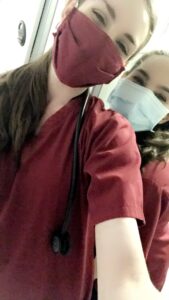 I hope everyone is keeping well and enjoying the start of a new school year! I am currently on module 3 of my final year rotations and have picked up a few tips and tricks along the way. I’ve made a list of tools and “must haves” to help you be prepared for your rotations when you get here!
I hope everyone is keeping well and enjoying the start of a new school year! I am currently on module 3 of my final year rotations and have picked up a few tips and tricks along the way. I’ve made a list of tools and “must haves” to help you be prepared for your rotations when you get here!
1) A small notebook and pen that fit in your scrub top pocket. Having something to take notes on is handy and is one of my most used tools. A notebook will allow you to keep a log of your cases throughout the day, and to jot down vitals while performing a clinical examination on your patients. You can purchase a pack of small-sized notebooks online and they are very inexpensive!
2) A journal to keep track of what you learn every day. Every night when I get home, I like to write down new experiences and keep log of any useful tips I may have learned. This is a tool that I will continue to look back through as I go through my rotations and when I begin practicing. I also think this is quite a nice way to keep track of memories and will be something I look back on fondly as I progress in my career.
3) Keep a document of your cases. When you go home at the end of a day of rotations, it may be tempting to get home and forget about school, but it can be useful to keep a log of your cases before you forget them. This can become a tool that you use for when you review for final year examinations and for when you meet similar cases in the future. I like to take a few minutes to research any topics that I wasn’t certain about during that day in rotation and add them to my document. For example, if you were working with a patient with a specific condition, it is useful to research that condition later in the evening to expand on your knowledge. This is helpful for me because I can then link that knowledge to the real-life case that I saw, and I tend to remember things better this way.
4) A list of the reference ranges for vitals of different species to keep in your pocket.
5) A stethoscope, a thermometer, a fob watch, and a pen torch. These are essential for your rotations to perform a complete clinical examination.
6) Although not completely necessary, I purchased a MiniVet Guide which I find is quite useful to quickly look up extra information for cases that I am handling. This guide fits in a scrub top pocket and is convenient!
7) Download the NOAHs compendium app on your phone. Its free and is handy for when you need to look up medications and dosages.
I hope this is useful and will help you to turn up to your final year rotations feeling confident and prepared! Best of luck.
Final (Year) Preparations
Final (Year) Preparations / Stories from Vet School by blogadmin is licensed under a Creative Commons Attribution CC BY 3.0



